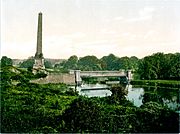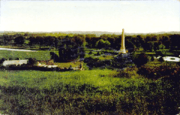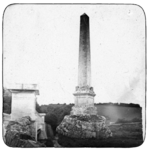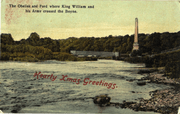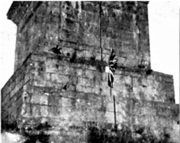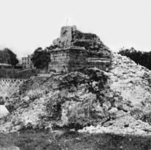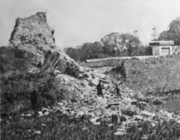Boyne Obelisk facts for kids
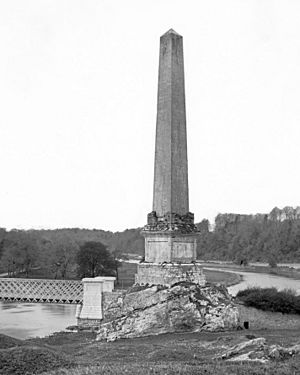
The obelisk in 1890
|
|
| Coordinates | 53°43′31.4″N 6°25′.2″W / 53.725389°N 6.416722°W |
|---|---|
| Location | Oldbridge, County Louth, Ireland |
| Type | Obelisk |
| Material | Granite |
| Height | 53 m (174 ft) |
| Completion date | c.1736 |
| Dedicated to | King William III |
| Dismantled date | 31 May 1923 |
The Boyne Obelisk was a tall, pointed stone monument. It was also known as King William's Obelisk. It stood in Oldbridge, near Drogheda, in County Louth, Ireland.
Contents
What was the Boyne Obelisk?
The Boyne Obelisk was built to remember a very important battle. This was the Battle of the Boyne in 1690. The monument celebrated the victory of King William III (also known as William of Orange). He won against King James II. The obelisk was placed near where William's soldiers crossed the River Boyne. This was to fight James's army.
The first stone of the monument was laid on April 17, 1736. This was done by Lionel Sackville. He was the King's representative in Ireland at the time.
Famous Visitors and Discoveries
A famous visitor to the obelisk was King George IV. He came on August 25, 1821. This was part of his visit to Ireland. Many people gathered to see the king. He spent about 20 minutes at the site.
In May 1894, something interesting was found. Two young men were collecting plants from the river. They found an old sword in the mud. It had a bone handle and a silver guard. The sword was rusty and had nicks. People thought it belonged to a soldier from the Battle of the Boyne.
Damage and Destruction
Around July 1895, the obelisk was hit by lightning. This caused a lot of damage. Money was raised to fix it. The repairs cost about £100.
In July 1913, during a time of political tension, some people visited the obelisk. They put a Union Jack flag on its base. They also left a sign. The sign said that no one could "tame the Lion Hearts of Ulster". The flag and sign were later taken down.
The Boyne Obelisk stood until May 31, 1923. It was destroyed shortly after the Irish Civil War ended. It is believed that soldiers used explosives to blow it up. Today, only a small part of the monument remains.
What did the Obelisk look like?
The Obelisk was made from granite stone. It was built on a large rock mound. This mound was about 9 meters (30 feet) high. It was on the north side of the River Boyne.
The monument was very tall. It stood 53 meters (174 feet) high. At the time it was built, it was the tallest man-made structure in Ireland. It was also the tallest obelisk in Europe.
Next to the obelisk was a wooden bridge. This bridge crossed the river. Later, a new iron bridge was built. It was finished in 1869. This new bridge was named the Obelisk Bridge, after the monument.
Messages on the Obelisk
The bottom part of the Obelisk was square. It had messages carved into each of its sides. These messages told about the battle and why the monument was built.
One side spoke about King William III. It said he crossed the river on July 1, 1690. He attacked King James II's army. The message said this battle helped secure "liberty, laws, and religion" for the future. It also mentioned that King James II left Ireland after this battle.
Another message honored Marshal the Duke of Schomberg. He was a leader who died fighting bravely during the battle.
A third message simply said: "In defence of Liberty, July 1st MDCLXXXX". This means "In defense of freedom, July 1st, 1690".
The last message explained who paid for the monument. It said it was built by "grateful contributions" from people in Great Britain and Ireland. These were people who supported King William.
Gallery
Images for kids
-
A piece of the Obelisk on display at the Museum of Orange Heritage in Belfast in 2021
 | Toni Morrison |
 | Barack Obama |
 | Martin Luther King Jr. |
 | Ralph Bunche |


